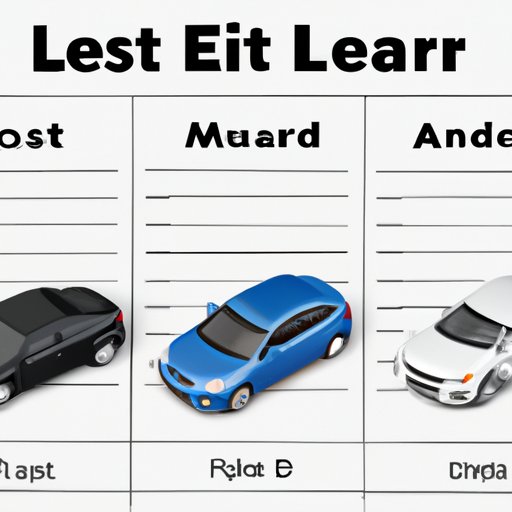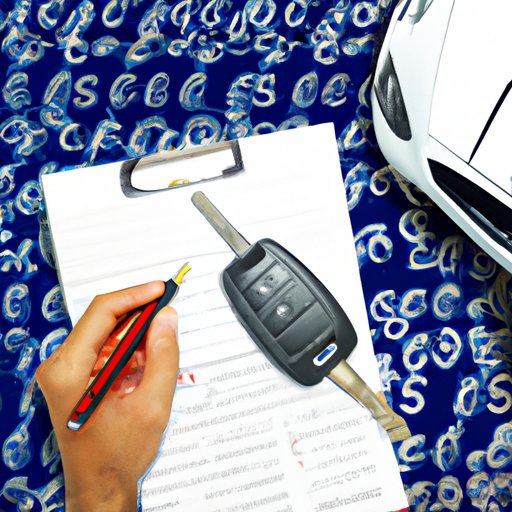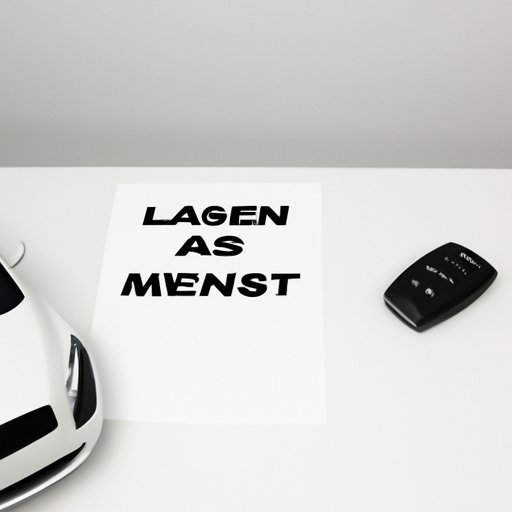Introduction
Leasing a car is a popular option for those who are looking to drive a new vehicle without having to commit to buying one outright. It allows you to have the use of a vehicle on a short-term basis while making manageable monthly payments. But how much does leasing a car actually cost? In this article, we’ll explore the costs associated with leasing a car, as well as the potential savings and fees involved.

Comparing Lease Costs for Different Vehicle Models
The cost of leasing a car will vary depending on the make and model of the vehicle. Factors such as the sticker price, annual mileage, and length of the lease term will all influence the overall cost. To get an idea of what kind of costs you can expect, let’s look at some examples.
Factors That Determine Lease Costs
When determining the cost of leasing a car, there are several factors that must be taken into account, including:
- Sticker Price – This is the manufacturer’s suggested retail price of the vehicle. The higher the sticker price, the higher the lease payments will be.
- Annual Mileage – Most leases come with an annual mileage limit. If you exceed this limit, you may be charged additional fees.
- Length of Lease Term – The longer the lease term, the lower the monthly payments will be.
Examples of Lease Costs for Different Models
Here are some examples of lease costs for different models of cars, based on a 36-month lease term with 10,000 miles per year:
- Toyota Corolla – $259/month
- Honda Civic – $279/month
- Ford F-150 – $399/month
- Chevrolet Silverado – $429/month
- BMW 5 Series – $679/month
Analyzing Factors That Impact the Cost of Leasing a Car
Now that we’ve looked at some examples of lease costs for different models, let’s take a closer look at the factors that can impact the cost of leasing a car.
Length of Lease Term
The length of the lease term is one of the most important factors when it comes to determining the cost of leasing a car. Generally speaking, the longer the lease term, the lower the monthly payments will be. Shorter lease terms tend to have higher payments, but they also give you the flexibility to upgrade to a newer model more often.
Down Payment
Another factor that can impact the cost of leasing a car is the amount of money you put down as a down payment. A larger down payment will reduce your monthly payments, while a smaller down payment may mean higher payments. It’s important to keep in mind that you won’t get this money back when the lease is up.
Trade-in Value
If you’re trading in your old car, the amount you get from the trade-in can affect the cost of leasing a car. Generally speaking, the more you get for your trade-in, the lower your monthly payments will be. On the other hand, if you don’t get much for your trade-in, you may end up paying more each month.
Mileage Limit
Most leases come with an annual mileage limit. If you exceed this limit, you may be charged additional fees or have to pay for extra miles at the end of the lease. It’s important to consider your driving habits when determining the right mileage limit for you.
Credit Score
Your credit score can also have an impact on the cost of leasing a car. Generally speaking, the higher your credit score, the lower your monthly payments will be. It’s important to keep in mind that a poor credit score could mean higher payments or even being denied a lease altogether.

Exploring Potential Savings by Leasing a Car
In addition to the cost savings associated with leasing a car, there are also other potential savings to consider. Let’s take a look at some of them.
Cash Rebates
Many car manufacturers offer cash rebates on certain models. These rebates can be used to reduce the cost of leasing a car. It’s important to check with the manufacturer to see what rebates are available.
Special Deals and Promotions
From time to time, car dealerships and automakers offer special deals and promotions on certain models. These deals and promotions can help reduce the cost of leasing a car. It’s important to check with your local dealership or automaker to see what deals are available.
Tax Benefits
Depending on where you live, leasing a car may provide some tax benefits. It’s important to speak with a tax professional to determine what tax benefits you may be eligible for.
Listing Common Fees and Expenses Associated with Leasing a Car
In addition to the monthly payments, there are other fees and expenses associated with leasing a car. Here are some of the most common ones:
Acquisition Fee
This fee is charged by the dealership or leasing company to cover the administrative costs of setting up the lease. It’s typically around $500-$1000, but can vary depending on the dealership or leasing company.
Security Deposit
A security deposit is usually required to cover any damages or excess wear and tear that may occur during the lease term. It’s typically around 10% of the total lease amount, but can vary depending on the dealership or leasing company.
Late Payment Fees
If you fail to make your monthly payments on time, you may be charged a late payment fee. It’s important to stay on top of your payments to avoid this fee.
Disposition Fee
This fee is charged by the dealership or leasing company when you turn in the vehicle at the end of the lease term. It’s typically around $300-$400, but can vary depending on the dealership or leasing company.

Examining the Benefits and Drawbacks of Leasing a Car
Leasing a car has its pros and cons. Let’s take a look at some of them.
Pros of Leasing a Car
- Lower monthly payments than financing a car
- Ability to drive a newer model car more often
- Potential for cash rebates, special deals and promotions, and tax benefits
Cons of Leasing a Car
- No equity built up in the car
- Additional fees and expenses associated with the lease
- Restrictions on modifications and customization of the vehicle
Conclusion
Leasing a car can be an economical option for those in need of a vehicle. There are many factors that can affect the cost of leasing a car, including the sticker price, annual mileage, length of the lease term, down payment, and credit score. There are also potential savings to be had through cash rebates, special deals and promotions, and tax benefits. Additionally, there are common fees and expenses associated with leasing a car, such as acquisition fees, security deposits, late payment fees, and disposition fees. Finally, it’s important to weigh the pros and cons of leasing a car before making a decision.
In conclusion, leasing a car can be a great way to get a new vehicle without having to buy one outright. By understanding the costs and potential savings associated with leasing a car, as well as the fees and expenses, you can make an informed decision about whether leasing is the right option for you.
(Note: Is this article not meeting your expectations? Do you have knowledge or insights to share? Unlock new opportunities and expand your reach by joining our authors team. Click Registration to join us and share your expertise with our readers.)
